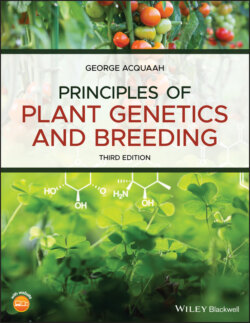Читать книгу Principles of Plant Genetics and Breeding - George Acquaah - Страница 45
Visibility and impact of WACCI
ОглавлениеA number of distinguished visitors have commended the WACCI program. Sir Gordon Conway, world‐renowned advocate for food security had this to say when he visited WACCI on November 24, 2011: “The training of Anglophones and Francophones under one umbrella in the area of plant breeding is an excellent concept and AGRA should be commended for sponsoring the program.” A former Chief Scientist of USAID, Dr. Julie Howard and then Director of the Bureau for Food Security, Dr. Robert Betram (now Chief Scientist) visiting WACCI on January 12, 2012, intimated that the regional approach at WACCI needed strengthening because it is what Africa must be doing. The Chicago Council on Global Affairs in 2009 endorsed WACCI in a major publication, “Renewing Leadership in the Fight Against Global Hunger and Poverty,” as a model which must be replicated in Africa and South East Asia. Ms. Lisa Eakman, then Director of Global Agriculture, the Chicago Council on Global Affairs, visited WACCI on September 8, 2010, and commended the management and staff for the visibility WACCI had gained a few years after inception. An independent review panel led by Dr. Rita Mumm, Professor Emerita and Founding Director of the Illinois Plant Breeding Centre, University of Illinois, Urbana‐Champaign, in 2015 assessed that following proposed recommendations, WACCI was well positioned to join the ranks of the top‐tier institutes educating plant breeding professionals globally. The panel added that “Given WACCI's evolution, strategic plans for further expansion, and record of success to date, we view WACCI as an institution poised to have a tremendous impact on food security for Africa in the decade ahead and beyond by providing Africans with vital education in Africa to meet regional and global needs.”
Graduates of the WACCI program are contributing immensely to the growth and development of agriculture in their respective countries. A survey conducted in 2019 to access the impact of the PhD training program revealed that the majority of the graduates were working with National Agricultural Research Institutions, whiles others had taken academic positions in public and private universities. Over 40 plant breeding projects have been initiated by these graduates who have attracted a number of research grants from national and international organizations such as Bill and Melinda Gates Foundation, MasterCard Foundation, AGRA, Govan Mbeki Research, ProjetMaïs UEMOA, PIGEPE/IFAD, and USAID/UC‐DAVIS.
The outputs from the research of the WACCI graduates include over 150 publications in high impact factor journals and the development and release of improved about 60 crop varieties including CRI‐AGRA Sp09 (sweet potato), Solo‐Gold (Sweet potato), Mbofara (Sweet potato), Asempa (Sweet potato), NAGODE (Maize), AGRILA (Maize), CRI‐Apraku (Maize), Aburolegon (Maize), AkuafoAburo (Maize), IKMR18001 (Pearl millet), and IKMR18009 (Pearl millet) just to name a few. Notable characteristics of some of these varieties include desirable morphological features, tolerance to low‐nitrogen soils, tolerance to pest and diseases, high beta carotene content, early maturing, and higher yielding compared to existing varieties. The adoption rate of newly developed varieties by farmers' ranges from 8% to 40%. This adoption rates are expected to increase over time as the released varieties are new introductions to farmers.
Some of these graduates are involved in the formulation of policies, serving in various capacities, developing of relevant curricula, as well as training and supervising undergraduate, masters and PhD students for the human and institutional resource development in their respective countries. By far, WACCI's most meaningful contribution to the future of African agriculture are the excellent plant breeders equipped with modern and conventional tools that have been churned out. These graduates who are currently 66 in number will increase to 81 by the end of the year 2019 and will number over 120 in the next three years. These are the cadres who would make an African Green Revolution possible in our lifetime. We believe that there will not be another Norman Borlaug in the world, but the collective work of the WACCI trained plant breeders will avert hunger and malnutrition in the turbulent, changing, and rapidly growing populations in the West Africa sub‐region. One can imagine how he would have been lost to the diaspora if he had left to study abroad. Training Africans in Africa for Africa in the area of plant breeding unquestionably is a concept that has proven to make good sense and impact. It has stood the test of time. It was not surprising that the Founder of Director of WACCI, Dr. Eric Yirenkyi Danquah, a Professor of Plant Genetics at the University of Ghana, received the World Agriculture Prize in 2018 from the Global Confederation of Higher Education Associations in Agriculture and Life Sciences (GCHERA) at Nanjing Agricultural University, China.
